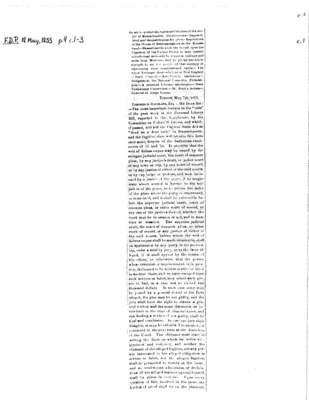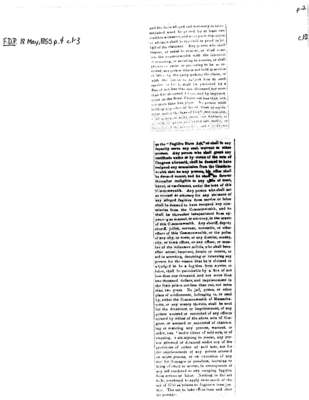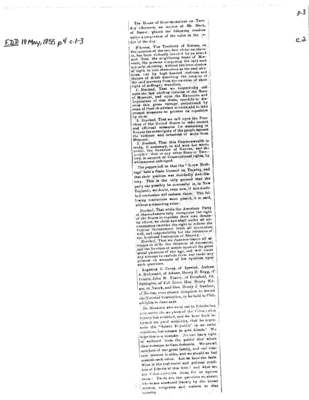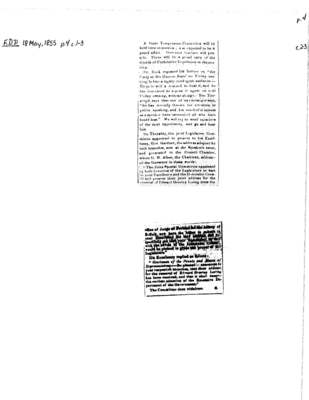Pages
D6788_Page_1
BOSTON, May 7th, 1855.
FREDERICK DOUGLASS, ESQ: MY DEAR SIR: —The most important feature in the "acts" of the past week is the Personal Liberty Bill, reported to the Legislature, by the Committee on Federal Relations, and which, if passed, will kill the Fugitive Slave Act as "dead as a door nail," in Massachusetts, and the fugitive slave will breathe free here once more, despite of the barbarous enactments of '93 and '50. It provides that the writ of habeas corpus may be issued by the supreme judicial court, the court of common pleas, by any justice's court, or police court of any town or city, by any court of record, or by any justice of either of the said courts, or by any judge of probate, and may be issued by a justice of the peace, if no magistrate above named is known to the said justice of the peace, to be within five miles of the place where the party is imprisoned, or restrained, and it shall be returnable before the supreme judicial court, court of common pleas, or other court of record, or any one of the justices thereof, whether the court may be in session or not, and in term time or vacation. The supreme judicial court, the court of common pleas, or other court of record, or any justice of either of the said courts, before whom the writ of habeas corpus shall be made returnable, shall on application by any party to the proceeding, order a trial by jury, as to the facts alleged, if it shall appear by the return of the officer, or otherwise, that the person whose restraint or imprisonment is in question, is claimed to be held to service or labor in another State, and to have escaped from such service or labor, may admit such person to bail, in a sum not to exceed two thousand dollars. In such case issue may be joined by a general denial of the facts alleged, the plea may be not guilty, and the jury shall have the right to return a general verdict, and the same discretion as juries have in the trial of criminal cases, and the finding a verdict of not guilty, shall be final and conclusive. In case one jury shall disagree, it may be submitted to another, or continued to the next term at the discretion of the Court. The claimant must state in writing the facts on which he relies with precision and certainty, and neither the claimant of the alleged fugitive, nor any person interested in his alleged obligation to service or labor, nor the alleged fugitive, shall be permitted to testify at the issue; and no confessions, admissions, or declarations of the alleged fugitive against himself shall be given in evidence. Upon every question of fact involved in the issue, the burden of proof shall be on the claimant,
D6788_Page_2
and the facts alleged and necessary to be established must be proved by at least two credible witnesses, and no ex parte deposition or affidavit shall be received as proof in behalf of the claimant. Any person who shall remove, or assist to remove, or shall come into the commonwealth with the intention of removing, or assisting to remove, or shall procure or assist in procuring to be so removed, any person who is not held to service or labor by the party making the claim, or with the intent to subject him to such service or labor, shall be punished by a fine of not less than one thousand nor more than five thousand dollars, and by imprisonment in the State Prison not less than one, not more than five years. No person while holding any office of honor, trust or emolument, under the laws of this Commonwealth, shall in any capacity, issue any warrant, or process, or grant any certificate, under, or by virtue of the act of 1793 and 1850, known as the "Fugitive Slave Act," or shall in any capacity serve any such warrant or other process. Any person who shall grant any certificate under or by virtue of the acts of Congress aforesaid, shall be deemed to have resigned any commission from the Commonwealth that he may possess, his office shall be deemed vacant, and he shall be forever thereafter ineligible to any office of trust, honor, or emolument, under the laws of this Commonwealth. Any person who shall act as counsel or attorney for any claimant of any alleged fugitive from service or labor shall be deemed to have resigned any commission from the Commonwealth, and he shall be thereafter incapacitated from appearing as counsel, or attorney, in the courts of this Commonwealth. Any sheriff, deputy sheriff, jailor, coroner, constable, or other officer of this Commonwealth, or the police of any city, or town, or any district, county, city, or town officer, or any officer, or member of the volunteer militia, who shall hereafter arrest, imprison, detain or return, or aid in arresting, detaining or returning any person for the reason that he is claimed or adjudged to be a fugitive from service or labor, shall be punishable by a fine of not less than one thousand, and not more than two thousand dollars, and imprisonment in the State prison not less than one, nor more than two years. No jail, prison, or other place of confinement, belonging to, or used by, either the Commonwealth of Massachusetts, or any county therein, shall be used for the detention, or imprisonment, of nay person accused or convicted of any offence created by either of the above acts of Congress, or accused or convicted of obstructing or resisting any process, warrant, or order issued under either, of said acts, or of rescuing, or attempting to rescue, any person arrested or detained under any of the provisions of either of said acts, nor for the imprisonment of any person arrested on mesne process, or on execution of any suit for damages or penalties, accruing or being claimed to accrue, in consequence of any aid rendered to any escaping fugitive from service or labor. Nothing in the act to be construed to apply to so much of the act of 1793 as relates to fugitives from justice. The act to take effect from and after its passage.
D6788_Page_3
The House of Representative on Tuesday afternoon, on motion of Mr. Slack, of Boston, placed the following resolves under a suspension of the rules in the order of the day:
Whereas, The Territory of Kanzas, on the occasion of the two first elections therein, has been violently invaded by an armed mob from the neighboring State of Missouri, the persons composing the said mob not only claiming, without the least shadow of right, to vote themselves at the said elections, but by high handed violence and threats of death deterring the citizens of the said territory from the exercise of their right of suffrage; therefore,
1. Resolved, That we respectfully call upon the law abiding citizens of the State of Missouri, and upon the Executive and Legislature of that State, speedily to disavow this gross outrage, perpetrated by some of their ill-advised citizens, and to take prompt measures to prevent its repetition by them.
2. Resolved, That we call upon the President of the United States to take instant and effectual measures for sustaining in Kanzas the sovereignty of the people against the violence and invasions of mobs from Missouri.
3. Resolved, That this Commonwealth is ready, if necessary, to aid with her whole power, the Governor of Kanzas, and the people of that or any other State or Territory, in support of Constitutional rights, by whomsoever infringed.
The papers tell us that the "Know Nothings" held a State Council on Tuesday, and that their position was decidedly Anti-Slavery. This is the only ground that the party can possibly be successful in, in New England; we doubt, even now, if this deathbed conversion will redeem them. The following resolutions were passed, it is said, without a dissenting voice:
Resolved, That while the American Party of Massachusetts fully recognizes the right of the States to regulate their own domestic affairs, we claim and shall under all circumstances exercise the right to relieve the Federal Government from all connection with, and responsibility for the existence of the Sectional Institution of Slavery.
Resolved, That we discountenance all attempts to stifle the freedom of discussion, and the freedom of action upon all the great moral questions of the age, and will resist any attempt to exclude from our ranks any persons on account of his opinions upon such questions.
Augustus C. Carey, of Ipswich, Andrew A. Richmond, of Adams, Henry H. Rugg, of Dennis, John W. Foster, of Brimfield, Ed. Buffington, of Fall River, Hon. Henry Wilson, of Natick, and Gov. Henry J. Gardner, of Boston, were chosen delegates to attend the National Convention, to be held in Philadelphia in June next.
Dr. Snowden who went out to Liberia last year, under the auspices of the Colonization Society has returned, and we have been informed on good authority, that he represents the "Infant Republic" in an awful condition, but refuses to give details! We hope this is a mistake. No one has a right to withhold from the public that which their common welfare demands. We are all members of one great family, and our common interest is alike, and we should so feel towards each other. Let us have the facts. What is the real social and political condition of Liberia at this time? and what are the Colonizationists doing for or against them? These are the questions we should like to see answered frankly by the actual settlers, emigrants and visitors to that country.
D6788_Page_4
A State Temperance Convention will be held here tomorrow; it is expected to be a grand affair. Governor Gardner will preside. There will be a grand rally of the friends of Prohibitive Legislation in the evening.
Dr. Rock repeated his lecture on "the Unity of the Human Race" on Friday evening, before a highly intelligent audience -- There is still a demand to hear it, and he has consented to repeat it again on next Friday evening, without charge. The Telegraph says that one of its exchanges says, "he has recently thrown his attention to public speaking, and his wonderful talents as a speaker have astonished all who have heard him." We will try to avail ourselves of the next opportunity, and go and hear him.
On Thursday, the joint Legislative Committee appointed to present to his Excellency, Gov. Gardner, the address adopted by both branches, met at the Speaker's room, and proceeded to the Council Chamber, where O. W. Albee, the Chairman, addressed the Governor in these words:
"The Joint Special Committee appointed by both branches of the Legislature to wait on your Excellency and the Honorable Council and present their joint address for the removal of Edward Greeley Loring from the office of Judge of Probate for the county of Suffolk, now have the honor to submit to your Excellency the said address, and respectfully ask that your Excellency, by and with the advice of the Honorable Council, would be pleased to grant the prayer of the Legislature."
His Excellency replied as follows:
"Gentlemen of the Senate and House of Representatives:--Be pleased to announce to your respective branches, that their address for the removal of Edward Greeley Loring, has been received, and that is shall receive the earliest attention of the Executive Department of the Government."
The Committee then withdrew.
S.



